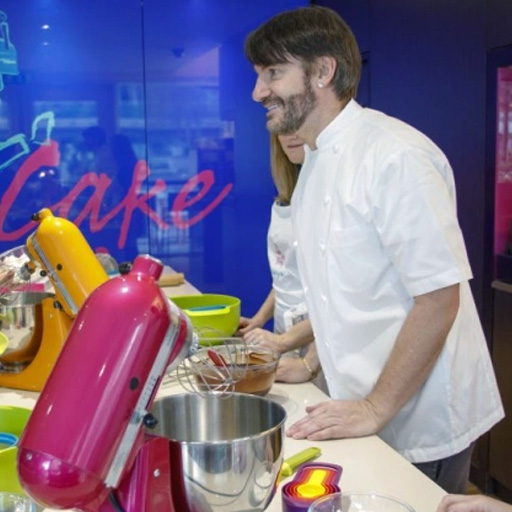Despite the economic doom and gloom, the market for quality chocolate is in buoyant form. While Tesco’s sales slumped in the run-up to Christmas, independent chocolatiers around the country enjoyed increased sales as the public’s appetite for good chocolate continues to grow.
“In the last three years, we’ve had substantial growth each year,” says Chantal Coady of Rococo. “This Christmas was way, way busier than the year before.” William Curley, too, happily reports “good growth on the retail side” over the Christmas period.
Despite the straitened times, many independent chocolatiers have been expanding their businesses. “We’ve just got our third shop in London which is in Soho and had an exceptionally busy Christmas across all three shops,” explains Paul A. Young.
Having recently made the move to selling his chocolates retail as well as wholesale, Paul Wayne Gregory is thrilled with how his chocolates sold at Christmas. “To be honest, we sold far more than we anticipated we would. It was crazy. I think we sold four times as much this year.”
Duffy Sheardown founded his Lincolnshire-based, artisan chocolate company Red Star in 2009. “It was only our second Christmas, so I had no idea what to expect,” he says candidly, “but it went well. We sold everything that I’d made, so I couldn’t have sold any more. We did the Chocolate Festival at London’s South Bank in December which went really well. Saturday, in particular, was ludicrously busy. You could barely move for the people crowding around the stalls.”
Cocoa Red, the Isle of Man’s first artisan chocolate company, also had a good Christmas. “We were around four times as busy as last year,” says Cocoa Red-founder Karl Berrie.
At a time when people are counting the pennies, why have they been so ready to spend their money on high-end chocolate? “I think it’s that thing of being an affordable luxury,” says Coady of Rococo, “and also it’s a great present. You buy something which is beautiful and tastes delicious and doesn’t have to be stored anywhere; it solves so many problems in one go.”
Paul Wayne Gregory feels that people “are spending money on quality. When you buy our Pure Indulgence box, every chocolate in the range has won an award.” Paul A. Young agrees that quality is key. “People are spending, but they’re spending on quality,” he says, “They want value for money and are not prepared to spend their money on something mediocre.”
Chocolate’s legendary feel-good capacity is another factor. “I think because it’s doom and gloom in the papers and on the telly, people like to have a little treat” observes Duffy Sheardown of Red Star. “The good thing is that people are buying themselves decent chocolate, instead of a Mars bar.”
“Considering how much work goes into it and the quality of the ingredients, high quality chocolate is not that expensive,” asserts Paul Wayne Gregory. Other chocolatiers agree with him. “My hand-made truffles are £2,” says Paul A Young, “and some people say that’s expensive – but just think how much people spend on a cup of coffee without giving it a second thought!” Red Star’s Duffy Sheardown thinks the outlay on a good-quality chocolate bar is “a small amount of money. I think anything under ten pounds is barely under the radar for people if they’re still working; if you’re not working, then every penny counts. People are worrying about the large amounts of money– the hundreds of pounds, not five pounds and ten pounds.”
For Chantal Coady, the price of decent chocolate reflects the cost of the raw materials. “You just have to think about wines and it becomes much more understandable,” she suggests. “Most people understand that there’s a difference between a £3.99 bottle of wine and a £10. There is the quality of the cocoa, the terroir, the care and love that goes into processing the cocoa and making the chocolate.” William Curley points out that “you can easily spend just a fiver on a small amount of quality chocolate and enjoy it, whereas to buy a bottle of fine wine you’d have to spend much more.”
All the chocolatiers whom Chocolatier.co.uk spoke to agree that the British public are becoming more knowledgeable about chocolate and discriminating in their chocolate buying habits. “People ask us a lot of questions in all our three shops,” says Paul A. Young. “They’re really interested.”
Events such as the Chocolate Festival offer a chance to inter-act with the public and explain some of the intricacies of how chocolate is made. “One of the things we try to do at fairs is say that these chocolate bars are made to exactly the same recipe, with the only difference coming from the cooca beans,” explains Red Star’s Duffy Sheardown. “So this one has a bright citrusy taste, but this one is more mellow, tastes of bananas and chestnuts. People always think they don’t know about chocolate and that they won’t be able to, but like anything if you try them side by side, you can taste the difference.”
“Here in the north-west of England, we’ve been trying to explain about fine quality chocolate to our customers,” says Cocoa Red’s Karl Berrie, “once people get it, they’re hooked.” “People are more sophisticated about most food and drink now,” observes Chantal Coady of Rococo, “chocolate is a comparative latecomer. The great thing about quality chocolate is that it can be a special treat.” Just as lipstick sales are said to go up when times are hard economically, so good chocolate seems to be one of those little luxuries that people are determined to treat themselves to.

